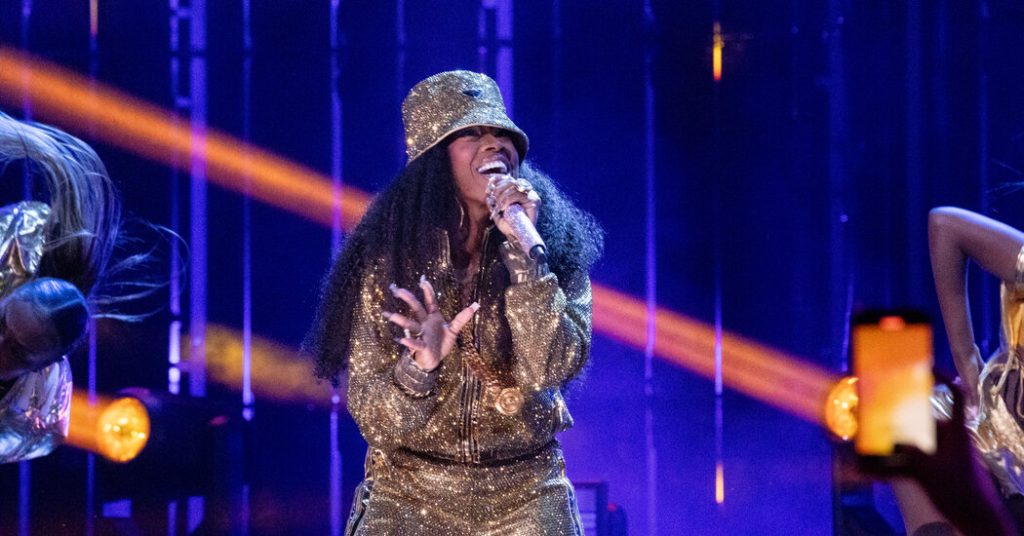Missy Elliott and Willie Nelson Join the Rock & Roll Hall of Fame

The Rock & Roll Hall of Fame inducted its 38th annual class of musical heroes on Friday at Barclays Center in Brooklyn, in a night dominated by strong women and giants from genres the institution had long treated as adjacent to rock.
The latest inductees in the flagship performer category included Willie Nelson, the 90-year-old country icon; Missy Elliott, the hall’s first female rapper; the singer-songwriter Sheryl Crow; George Michael, the larger-than-life pop singer of Wham! who became one of pop’s first openly gay heroes; the soul vocal act the Spinners; Kate Bush, the eclectic British performer, who did not attend; and the political firebrands Rage Against the Machine, who were represented solely by their guitarist, Tom Morello.
In other categories, the hall inducted DJ Kool Herc, who presided over hip-hop’s founding party 50 years ago; the rockabilly guitarist Link Wray; the spitfire R&B singer Chaka Khan; Al Kooper, one of rock’s most well-traveled musicians, who played with Bob Dylan, the Rolling Stones and many others; Bernie Taupin, Elton John’s longtime songwriting partner; and Don Cornelius, the creator and host of the TV show “Soul Train.”
The induction came less than two months after the Rock Hall ejected Jann Wenner, one of its founders, who made disparaging remarks about female and Black performers as part of a New York Times interview. This year’s class demonstrated the organization’s recent commitment to inclusion, but the night didn’t end without a barbed reference to the controversy.
“I’m honored to be in the class of 2023, alongside such a group of profoundly ‘articulate’ women and outstanding, ‘articulate’ Black artists,” said Taupin, echoing Wenner’s comments in the interview.
Here are some highlights from the show.
Stars from beyond rock’s borders
Some of the most commanding presences were artists outside the traditional boundaries of rock ’n’ roll who claimed their places in music history proudly.
In an arena-worthy spectacle that began with her own countdown clock, Elliott arrived onstage just after midnight outfitted in gold and surrounded by a phalanx of backup dancers. After an energetic spin through abbreviated versions of songs including “Get Ur Freak On,” “The Rain (Supa Dupa Fly)” and “Work It,” she got emotional at the podium, revealing that this was the first time her mother had seen her perform. (Elliott hadn’t wanted to rap risqué records in front of her mom because “she from the church” she said, to laugher.)
She mentioned women innovators who “gave me their shoulders to stand on,” including Pepa, Queen Latifah (who inducted her) and Roxanne Shante, and noted that on hip-hop’s 50th anniversary, she felt the magnitude of the moment: “You just feel like it’s so far to reach when you in the hip-hop world, and to be standing here, it means so much to me.”
Earlier, Nelson sat stone-faced, in his signature red bandanna and long braids, as Dave Matthews gave a rambling but affectionate induction speech, praising Nelson’s longevity and history of activism — and his well-known penchant for marijuana.
Nelson, who has been a member of the Country Music Hall of Fame for 30 years, cut to the chase in a brief acceptance speech, saying, “I never paid much attention to categories, and I’m not sure fans did either.” At 90, Nelson’s love of performing was still palpable. Seated and playing a weathered acoustic guitar, he nimbly ran through riffs and solos, leading his band on classics like “Whiskey River,” “On the Road Again,” and, joined by Crow, “Crazy,” his song made famous by Patsy Cline.
Women celebrated women
As recently as 2016, there were years when the hall welcomed no women. But on Friday, they were a strong presence, and honored one another onstage and in supportive statements.
The night kicked off with Crow, who began her career as a backup singer for Michael Jackson before breaking out on her own in the 1990s with hits like “All I Wanna Do.” She was joined onstage by Olivia Rodrigo, the 20-year-old pop star, for a duet of “If It Makes You Happy,” a power ballad about vulnerability. And Stevie Nicks of Fleetwood Mac — in black lace and fingerless gloves — sang with Crow on “Strong Enough.”
In a video segment, Nicks called Crow “everything that every girl should want to be.” In her acceptance speech, Crow thanked her parents “for all the years of unconditional love,” adding, “and piano lessons.”
Khan sang her hits “Ain’t Nobody” and “Sweet Thing” with H.E.R. and “I’m Every Woman” with the pop singer and songwriter Sia, who entered the stage in a gigantic, rainbow-colored wig that obscured her face. In accepting her honor, Khan spent much of her time praising Jazmine Sullivan, the R&B singer who inducted her.
Queen Latifah introduced Elliott by noting all the boundaries she’d broken: “Missy has never been afraid to speak out about the preconceptions, the stereotypes, the string of misogyny and the obstacles that have been placed in the way of women.”
A night of notable absences
The ceremony was defined as much by who wasn’t there as who was.
Bush, who shot up the charts last year when a decades-old song, “Running Up That Hill (A Deal With God),” was used in the TV show “Stranger Things,” did not attend. Neither did three of the four members of Rage Against the Machine. And some of the most uproarious applause in the arena was for Michael, who died in 2016.
Bush, who has not performed in public in nine years, was celebrated for her singularly dark and theatrical vision. The singer St. Vincent, her wide eyes staring straight ahead, performed “Running Up That Hill” in a black puffy lace top. In a statement posted to her website on Friday, Bush thanked the Rock Hall for welcoming her to “the most extraordinary rostrum of overwhelming talent.”
Michael was inducted by Andrew Ridgeley, his childhood friend and partner in Wham!, who appeared in a crisp purple three-piece suit. He spoke of Michael’s intense drive for fame as well as his talents in the studio as a writer and producer and added, “His beauty gave balm and succor to the listener.”
Though Rage Against the Machine didn’t perform, Morello gave a fiery speech following Ice-T’s induction that endorsed music’s power to spark progress. “Can music change the world?” he said, peppering his remarks with profanities. “The entire [expletive] aim is to change the world,” he proclaimed.
Smaller names who made a big impact
Some of the most poignant moments came in celebrations of people who were never household-name stars. These fulfilled one of the Rock Hall’s key missions of contextualizing pop music history and shining lights on figures whose influence was greater than their fame.
The Spinners began as a doo-wop group in Michigan in the 1950s, then spent years without fame at Motown before signing to Atlantic Records and making a string of hits that defined Philadelphia soul. DJ Kool Herc, who took the stage with a cane, was honored as a father of hip-hop and gave a tearful speech thanking various people from throughout his life, including artists like James Brown and Harry Belafonte.
In a video inducting Link Wray, the rockabilly guitarist whose snarling 1958 instrumental “Rumble” became a controversial hit — it was banned in some cities, out of fear it would incite violence — Jimmy Page of Led Zeppelin called Wray “my hero,” saying the song taught him “the drama you could set up with six strings.” He then appeared on the Barclays stage, leading a performance of “Rumble” with a three-piece rockabilly combo.
John told of how his 56-year songwriting partnership with Taupin started randomly, when a record company paired them together, and spoke passionately about the underappreciated role of lyricists. Then, at the piano, John gave a stirring performance of “Tiny Dancer,” one of their most enduring collaborations.
Taupin summed up his speech with an appeal to accept the all-inclusive borders of pop music.
“It means no walls, no inherent snobbery,” he said. “It means we’re all in this together.”
Caryn Ganz and Emmanuel Morgan contributed reporting.





